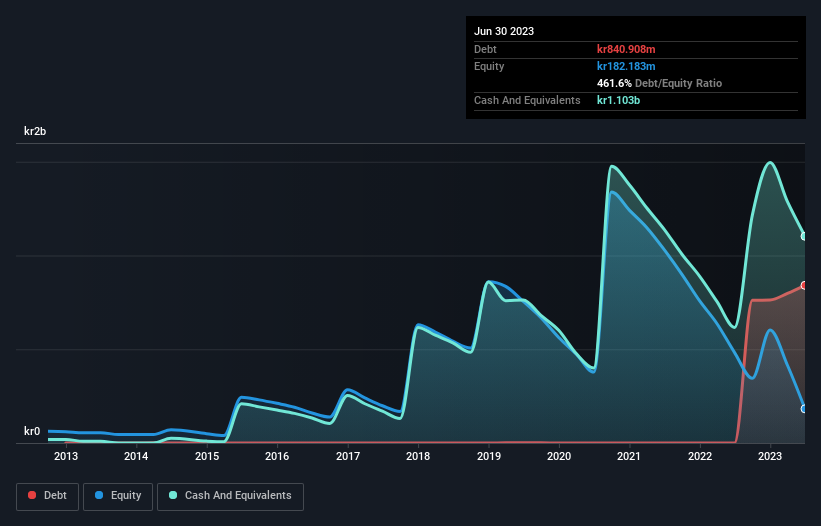Some say volatility, rather than debt, is the best way to think about risk as an investor, but Warren Buffett famously said that 'Volatility is far from synonymous with risk.' When we think about how risky a company is, we always like to look at its use of debt, since debt overload can lead to ruin. Importantly, Hansa Biopharma AB (publ) (STO:HNSA) does carry debt. But the more important question is: how much risk is that debt creating?
When Is Debt A Problem?
Generally speaking, debt only becomes a real problem when a company can't easily pay it off, either by raising capital or with its own cash flow. Ultimately, if the company can't fulfill its legal obligations to repay debt, shareholders could walk away with nothing. While that is not too common, we often do see indebted companies permanently diluting shareholders because lenders force them to raise capital at a distressed price. Of course, debt can be an important tool in businesses, particularly capital heavy businesses. When we think about a company's use of debt, we first look at cash and debt together.
Check out our latest analysis for Hansa Biopharma
What Is Hansa Biopharma's Net Debt?
The image below, which you can click on for greater detail, shows that at June 2023 Hansa Biopharma had debt of kr840.9m, up from none in one year. However, it does have kr1.10b in cash offsetting this, leading to net cash of kr261.6m.

How Strong Is Hansa Biopharma's Balance Sheet?
We can see from the most recent balance sheet that Hansa Biopharma had liabilities of kr301.6m falling due within a year, and liabilities of kr878.7m due beyond that. On the other hand, it had cash of kr1.10b and kr129.9m worth of receivables due within a year. So it can boast kr52.1m more liquid assets than total liabilities.
This short term liquidity is a sign that Hansa Biopharma could probably pay off its debt with ease, as its balance sheet is far from stretched. Simply put, the fact that Hansa Biopharma has more cash than debt is arguably a good indication that it can manage its debt safely. There's no doubt that we learn most about debt from the balance sheet. But ultimately the future profitability of the business will decide if Hansa Biopharma can strengthen its balance sheet over time. So if you're focused on the future you can check out this free report showing analyst profit forecasts.
In the last year Hansa Biopharma wasn't profitable at an EBIT level, but managed to grow its revenue by 106%, to kr159m. So there's no doubt that shareholders are cheering for growth
So How Risky Is Hansa Biopharma?
By their very nature companies that are losing money are more risky than those with a long history of profitability. And the fact is that over the last twelve months Hansa Biopharma lost money at the earnings before interest and tax (EBIT) line. Indeed, in that time it burnt through kr629m of cash and made a loss of kr759m. However, it has net cash of kr261.6m, so it has a bit of time before it will need more capital. Importantly, Hansa Biopharma's revenue growth is hot to trot. While unprofitable companies can be risky, they can also grow hard and fast in those pre-profit years. When analysing debt levels, the balance sheet is the obvious place to start. But ultimately, every company can contain risks that exist outside of the balance sheet. To that end, you should be aware of the 1 warning sign we've spotted with Hansa Biopharma .
If, after all that, you're more interested in a fast growing company with a rock-solid balance sheet, then check out our list of net cash growth stocks without delay.
Valuation is complex, but we're here to simplify it.
Discover if Hansa Biopharma might be undervalued or overvalued with our detailed analysis, featuring fair value estimates, potential risks, dividends, insider trades, and its financial condition.
Access Free AnalysisHave feedback on this article? Concerned about the content? Get in touch with us directly. Alternatively, email editorial-team (at) simplywallst.com.
This article by Simply Wall St is general in nature. We provide commentary based on historical data and analyst forecasts only using an unbiased methodology and our articles are not intended to be financial advice. It does not constitute a recommendation to buy or sell any stock, and does not take account of your objectives, or your financial situation. We aim to bring you long-term focused analysis driven by fundamental data. Note that our analysis may not factor in the latest price-sensitive company announcements or qualitative material. Simply Wall St has no position in any stocks mentioned.
About OM:HNSA
Hansa Biopharma
A biopharmaceutical company, engages in development and commercialization of treatments for patients with rare immunological conditions in Sweden, North America, and rest of Europe.
High growth potential and fair value.
Market Insights
Community Narratives




